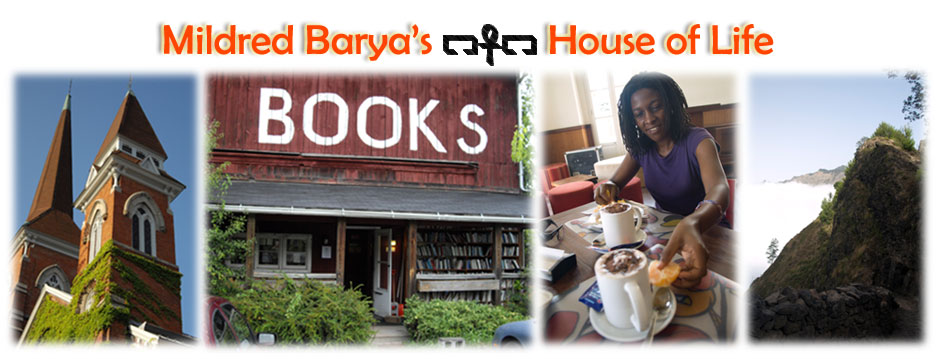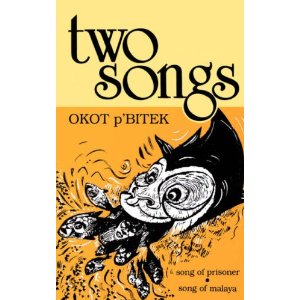Okot p’Bitek might be the most remembered and known Ugandan poet, born June 7, 1931 – July 20, 1982. His most popular books: Song of Lawino (1969), Song of Ocol (1970), and Two Songs: Song of a Prisoner, Song of Malaya (1971) enjoyed a cherished position for years on Uganda’s syllabus for high school and college.
Okot P’Bitek will be celebrated this year on 20th, July, 2012, marking thirty years since his death. But I’m not happy that there’s no organized site, virtual or otherwise where folks can go to post stuff concerning the conference, no idea how and what the celebrations will entail, except this call for submissions, which really doesn’t say much in spite of the inspiring poet Okot was. July will be here soon but what’s there to show that we are reaching deep down our hearts and minds to tap into the poetry spirit that changed Uganda’s literary scene especially in the 1960’s?
On my part I’m revisiting Poems from East Africa, an anthology published in June 1971, featuring 50 poets (some of them now deceased), from Kenya, Uganda, and Zambia, edited by David Cook and David Rubadiri. I’m delighting in the gentle lyricism that’s in most of the poems, the flow of passion and creativity that might have been the spirit of the time (what happened??), and remembering how with my high school friends we modeled our first love letters on some of these poems. Laban Erapu, one of the contributors in the anthology with the following two poems that I embraced when I was a teenager:
I Beg You
I beg you,
If you feel something like love for me,
Not to let me know it now
When I feel nothing so certain for you –
Wait until you’ve conquered my pride
By pretending not to care for me.
I beg you,
If you think your eyes will give you away,
Not to give me that longing look
When you know it will force the moment –
Wait until our heartbeats have settled
Then put your head on my shoulder.
I beg you
Not to let us surrender to passion
Until our liking has grown to love:
Let’s stop and look back,
Let’s draw apart and sigh,
Let’s stand back to back,
Let’s say goodbye for the day
And walk our different ways
Without pausing to wait
For an echo to our last word.
I beg you,
If you find yourself interlocked
In my embrace,
To kiss me and keep me silent
Before I start making promises
That time may choose to by-pass –
Wait until our hands are free,
Then listen to me;
Wait until our love is primed,
Then give me your hand.
—
The Eyes That Wouldn’t Wander
Yours were the eyes that wouldn’t wander,
We met and parted like strangers,
Strangers who would not forget
But met again and again
As if by chance,
Bypassing each other and smiling
As though to someone else.
What was it that led us
Somewhere beyond
The eyes of the crowd
To a lonely spot
Where the eyes that wouldn’t wander
Slowly rose and looked into mine?
What was this feeling
That raptured my nerves
As your trim fingers
Linked with mine?
What power lay hidden
In those eyes
That wouldn’t wander?
Taken from: Poems from East Africa, edited by David Cook and David Rubadiri, Heiinemann–African Writers Series, 1971.
Laban Erapu, who has lived and taught in Uganda, Kenya, Zambia and South Africa, will be Author of the Month at Femrite on February 27, 2012. Maybe he’ll awaken some new poetic flowerings so the creative energy of the 1960’s will recur in our present age.
A few more poets that were my gift–student’s companion–in my high school and then I’ll close.
Kwesi Brew (Ghanaian) with the poem, The Mesh, published in Poems of Black Africa, edited by Wole Soyinka, HILL and WANG, NY, 1975.
The Mesh
We have come to the cross-roads
And I must either leave or come with you.
I lingered over the choice
But in the darkness of my doubts
You lifted the lamp of love
And I saw in your face
The road that I should take.
—
(Oh, how I loved the romance of it, the simplicity, the sentimental touch!)
And now Richard Ntiru with his poem:
If It Is True
If it is true
that the world talks too much
then lets all keep quiet
and hear the eloquence
of silence
If it is true
that the world sees too much
then let’s all close our eyes
and see the inner vision
beneath the closed eyes
if it is true
that the world hears too much
then let’s wax our ears
and listen to the chastity of inner music
that defies betrayal
by the wayward wind
If it is true
that the world moves too much
then let’s stand statuestill
and imitate the stubborn will
of trees
that move without being peripatetic
for the dumb don’t tell lies
for the blind can’t be peeping toms
for the deaf cannot eavesdrop
for the crippled can’t trespass.
Published in Poems of Black Africa, edited by Wole Soyinka, HILL and WANG, NY, 1975.
Though not related in subject matter, ‘If It Is True’ somehow reminded me of Claude McKay‘s ‘If We Must Die.’ Maybe because of the tone or the beginning with If. I generally love poems that begin with If…
If We Must Die
If we must die, let it not be like hogs
Hunted and penned in an inglorious spot,
While round us bark the mad and hungry dogs,
Making their mock at our accursèd lot.
If we must die, O let us nobly die,
So that our precious blood may not be shed
In vain; then even the monsters we defy
Shall be constrained to honor us though dead!
O kinsmen! we must meet the common foe!
Though far outnumbered let us show us brave,
And for their thousand blows deal one death-blow!
What though before us lies the open grave?
Like men we’ll face the murderous, cowardly pack,
Pressed to the wall, dying, but fighting back!
Source: Claude McKay, “If We Must Die,” in Harlem Shadows: The Poems of Claude McKay (New York: Harcourt, Brace and Co., 1922).
—
Okay, will end with another of Richard Ntiru that I actually memorized and put in poster form because I wanted to imitate the philosophizing quality.
The Gourd of Friendship
Where is the curiosity we’ve lost in discovery?
Where is the discovery we’ve lost in knowledge?
Where is the knowledge we’ve lost in communication?
Where is the communication we’ve lost in mass media?
Where is the message we’ve lost in the medium?
And where is the community we’ve lost in all these?
It is easy to go to the moon:
There, there are no people.
It is easier to count the stars:
They will not complain.
But the road to your neighbour’s heart –
Who has surveyed it?
The formula to your brother’s head –
Who has devised it?
The gourd that doesn’t spill friendship-
In whose garden has it ever grown?
You never know despair
Until you’ve lost hope;
You never know your aspiration
Until you’ve seen others’ disillusionment.
Peace resides in the hearts of men
Not in conference tables and delegates’ signatures
True friendship never dies-
It grows stronger the more it is tested.
Published in Poems of Black Africa, edited by Wole Soyinka, HILL and WANG, NY, 1975.


3 Responses to Celebrating Okot p’Bitek and the poets of the 60’s